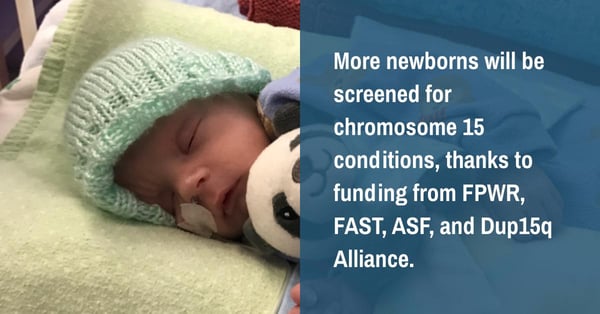The Foundation for Prader-Willi Research (FPWR), Foundation for Angelman Syndrome Therapeutics (FAST), Angelman Syndrome Foundation (ASF), and Dup15q Alliance announce a collaborative initiative to fund the addition of chromosome 15 conditions to Early Check, a flexible framework amenable to screening for a variety of conditions. Led by RTI International, Early Check will support the infrastructure necessary to add Prader-Willi syndrome, Angelman syndrome, and Dup15q syndrome to the Newborn Screening Panel.

Prader-Willi syndrome, Angelman syndrome, and Dup15q are collectively recognized as chromosome 15 (C15) conditions. Each condition results in inappropriate DNA methylation patterns, which causes the disruption of imprinted gene regulation. The three conditions can have very different symptoms, however, they each share chromosomal origins and diagnostic options. Prader-Willi syndrome, Angelman syndrome, and Dup15q are targets for emerging therapeutics, including promising disease-modifying strategies, that can potentially benefit greatly from early diagnosis. Newborn screening (NBS) provides the only population-based strategy to identify newborns who could benefit from early disease diagnosis and treatment, as well as more accurately understand the prevalence of each disorder in a prospective manner.
Early Check was developed to create the necessary infrastructure for rare diseases to be included in the Newborn Screening Panel. The results from Early Check studies provide evidence for true disease prevalence, patterns of symptom onset, natural history, and clinical outcomes, all of which are necessary to accelerate development of new outcomes, including the implementation of screening for new conditions.
“Newborn screening is an important public health program that helps identify infants with conditions before symptoms emerge, allowing for earlier treatment and eliminating the often stressful diagnostic odyssey for families,” said Anne Wheeler, Ph.D., research public health analyst for RTI International. “The Early Check program in North Carolina was designed to help rare conditions, like Angelman, Prader-Willi and Dup15q syndromes, build the evidence needed to make a case for adding newborn screening to state panels. This project will provide the funding to build an infrastructure to add chromosome 15 conditions to the Early Check panel and develop evidence of benefit for newborns with these conditions and their families.
Led by RTI International, Early Check was established as a joint collaboration among researchers, public health professionals and clinicians at RTI International, the University of North Carolina at Chapel Hill, Duke University, Wake Forest School of Medicine and the NC State Laboratory of Public Health. For more information on Early Check, please visit earlycheck.org.
About Angelman Syndrome
Angelman syndrome is a rare, neurogenetic disorder caused by loss-of-function of the maternally inherited allele of the UBE3A gene. It is estimated to affect 1 in 12,000 to 1 in 20,000 people globally. Individuals with Angelman syndrome have developmental delays, balance issues, motor impairment, and debilitating seizures. Some are unable to walk and most do not speak. While individuals with Angelman syndrome have a normal lifespan, they require continuous care and are unable to live independently. There are currently no approved therapies for Angelman syndrome; however, several symptoms of this disorder can be reversed in adult animal models of Angelman syndrome, suggesting that improvement of symptoms can potentially be achieved at any age.
About Dup15q Alliance and dup15q syndrome
Dup15q Syndrome is a clinically identifiable syndrome which results from the duplication (or multiplication) of a portion of chromosome 15. Dup15q Syndrome is characterized by having an extra copy of a portion of chromosome 15 in the 11.2 – 13.1 region in combination with a number of symptoms that may include, hypotonia, epilepsy, cognitive delay, motor delays, autism, similar facial features.
The Dup15q Alliance empowers individuals living with Dup15q Syndrome and other related rare diseases to reach their full potential by advancing breakthrough research and life-changing therapeutic treatments, supporting families and promoting advocacy. Dup15q Alliance provides family support and promotes awareness, research and targeted treatments for chromosome 15q11.2-13.1 duplication syndrome. Through our work to raise awareness and promote research into chromosome 15q duplications, we seek to find targeted treatments so that affected individuals can live full and productive lives. Together with our families, Dup15q Alliance is working towards a better tomorrow for children with chromosome 15q11.2-13.1 duplication (dup15q) syndrome.
About Prader-Willi Syndrome
Prader-Willi syndrome (PWS) is a complex genetic disorder that manifests with low muscle tone, endocrine symptoms, metabolic abnormalities, short stature, cognitive disabilities, and behavior and mental health problems. The hallmark feature of PWS is a chronic, unrelenting hunger (hyperphagia), which develops during childhood and can lead to excessive eating and life-threatening obesity. PWS occurs in approximately one in every 15,000 births, affecting males and females equally, and all races and ethnicities. There are currently no approved therapies to treat the hyperphagia/appetite, metabolic, cognitive function, or behavioral aspects of the disorder, but early diagnosis and treatment with growth hormone therapy improves growth, body composition and development.








